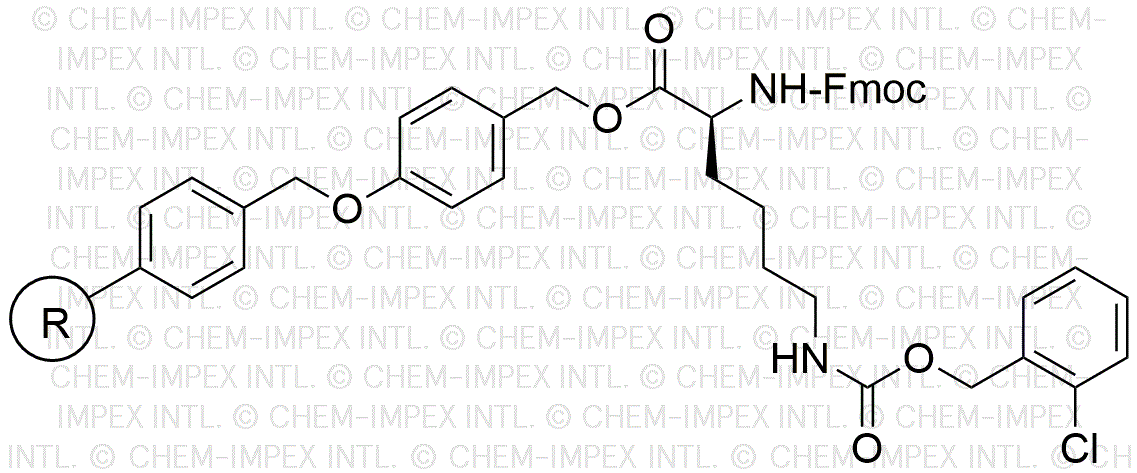Na-Fmoc-Ne-2-chloro-Z-L-lysine 4-alkoxybenzyl alcohol resin is widely utilized in research focused on:
- Peptide Synthesis: This compound serves as a key building block in solid-phase peptide synthesis, allowing researchers to create complex peptides efficiently.
- Drug Development: It plays a crucial role in the development of peptide-based therapeutics, providing a platform for the design of new drugs targeting various diseases.
- Bioconjugation: The resin can be used for bioconjugation processes, facilitating the attachment of peptides to other biomolecules, which is essential in creating targeted therapies.
- Research in Cancer Treatment: Its application in developing peptide ligands for cancer-targeting agents helps in advancing personalized medicine approaches.
- Protein Engineering: This compound is valuable in protein engineering, enabling the modification of proteins to enhance their stability and functionality for various applications.
Información general
Propiedades
Seguridad y normativas
Aplicaciones
Na-Fmoc-Ne-2-chloro-Z-L-lysine 4-alkoxybenzyl alcohol resin is widely utilized in research focused on:
- Peptide Synthesis: This compound serves as a key building block in solid-phase peptide synthesis, allowing researchers to create complex peptides efficiently.
- Drug Development: It plays a crucial role in the development of peptide-based therapeutics, providing a platform for the design of new drugs targeting various diseases.
- Bioconjugation: The resin can be used for bioconjugation processes, facilitating the attachment of peptides to other biomolecules, which is essential in creating targeted therapies.
- Research in Cancer Treatment: Its application in developing peptide ligands for cancer-targeting agents helps in advancing personalized medicine approaches.
- Protein Engineering: This compound is valuable in protein engineering, enabling the modification of proteins to enhance their stability and functionality for various applications.
Documentos
Hojas de datos de seguridad (HDS)
La SDS proporciona información de seguridad completa sobre la manipulación, el almacenamiento y la eliminación del producto.
Especificación del producto (PS)
La PS proporciona un desglose completo de las propiedades del producto, incluida la composición química, el estado físico, la pureza y los requisitos de almacenamiento. También detalla los rangos de calidad aceptables y las aplicaciones previstas del producto.
Certificados de análisis (COA)
Busque certificados de análisis (COA) ingresando el número de lote del producto. Los números de lote y de partida se pueden encontrar en la etiqueta de un producto después de las palabras "Lote" o "Lote".
Número de catálogo
Número de lote/lote
Certificados de origen (COO)
Este certificado de origen confirma el país en el que se fabricó el producto y también detalla los materiales y componentes utilizados en él y si se deriva de fuentes naturales, sintéticas u otras fuentes específicas. Este certificado puede ser necesario para cumplir con las normativas aduaneras, comerciales y regulatorias.
Número de catálogo
Número de lote/lote
Hojas de datos de seguridad (HDS)
La SDS proporciona información de seguridad completa sobre la manipulación, el almacenamiento y la eliminación del producto.
DownloadEspecificación del producto (PS)
La PS proporciona un desglose completo de las propiedades del producto, incluida la composición química, el estado físico, la pureza y los requisitos de almacenamiento. También detalla los rangos de calidad aceptables y las aplicaciones previstas del producto.
DownloadCertificados de análisis (COA)
Busque certificados de análisis (COA) ingresando el número de lote del producto. Los números de lote y de partida se pueden encontrar en la etiqueta de un producto después de las palabras "Lote" o "Lote".
Número de catálogo
Número de lote/lote
Certificados de origen (COO)
Este certificado de origen confirma el país en el que se fabricó el producto y también detalla los materiales y componentes utilizados en él y si se deriva de fuentes naturales, sintéticas u otras fuentes específicas. Este certificado puede ser necesario para cumplir con las normativas aduaneras, comerciales y regulatorias.

